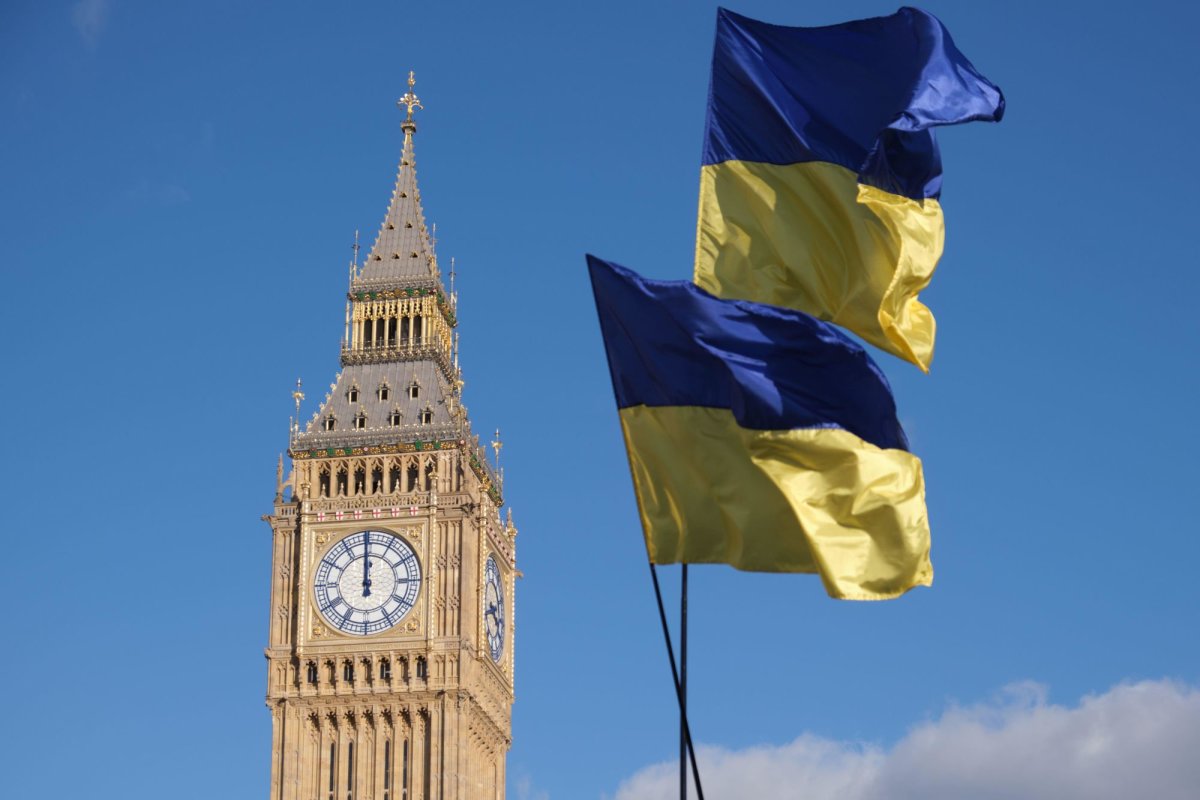
There are still hundreds of thousands of Ukrainian refugees in the UK (Alamy)
8 min read
As the war in Ukraine rages on, thousands of refugees in the UK are stuck in limbo due to uncertainty around the Government’s visa extension scheme.
It has been nearly three years since the full-scale invasion of Ukraine by Russia, and in that time around six million refugees from Ukraine have sought safety across Europe. More than 250,000 of these refugees were taken in by the UK.
Ukrainians who have come to the UK under one of the Ukraine Schemes can apply to stay for a further 18 months under the new Ukraine Permission Extension scheme, with applications opening on 4 February 2025.
However, the scheme could present a dilemma for thousands of refugees. The Home Office advises that applications will “usually” get a decision within eight weeks. As most of these Ukrainians arrived in the UK around March 2022, many of their three-year visas could expire before receiving a decision on their application for the extension scheme.
This gap could leave as many as 100,000 people facing uncertainty as they are currently unable to prove to employers and landlords that they can stay in the UK beyond March. As a result, they are struggling to find and keep accommodation and jobs.
As there is no way of proving their eligibility to stay beyond March, Anna Dezyk, Deputy Chair of the Association for Ukrainians in Great Britain (AUGB), said that many Ukrainians are being “asked to leave their homes, not being able to extend their rental agreements, or not being able to extend their employment”.
She said it was a “conflict of policy” from the UK Government: “On the one hand, they’re trying to encourage people to be independent and leave their sponsors, and on the other hand, they’re not giving them the evidence for the security of being able to stay in the country.”
Irina Terlecky, Non-Executive Director of AUGB and Chair of the Association of Ukrainian Women, said the AUGB has been pressing the Home Office to provide Ukrainians with some kind of assurance for their landlords or employers to cover the potential gap left by the extension scheme.
While she acknowledged that the Ministry of Housing, Communities and Local Government (MHCLG) was “doing everything that it can” to support refugees on the ground, she said the Home Office was a “slightly different matter”: “They’re always looking at not wanting to set precedents in terms of general immigration policy or immigration rules, and they’re a bit cagey about what they can and can’t do.”

Maria Romanenko is an award-winning Ukrainian activist who offers various schemes to support Ukrainians with life in the UK. She described a great degree of “uncertainty” around the Government’s plans going forward, including who might be eligible for the extension scheme.
Multiple campaigners told PoliticsHome they had concerns over the Home Office’s capacity to process all these applications, with the UK already struggling with a huge asylum backlog. Dezyk claimed some people were looking for other routes to stay in the UK such as claiming asylum: “Which is the worst thing that they could do because it would put them in limbo.”
According to Lauren Scott, Chief Executive Officer of UK charity Refugees at Home, there is a “real concern” that this search for alternative routes is leading to some Ukrainians falling victim to scams. PoliticsHome understands that charitable organisations have presented the Government with examples of Ukrainians being cheated out of their money by scammers claiming they can fast-track the visa extension scheme.
“When people are uncertain, they become vulnerable to all kinds of scammers,” Terlecky said.
For many Ukrainians, government support has already been patchy. Although the Ukraine schemes had originally been described by ministers as “wraparound support”, many British hosts were surprised by the level of responsibility they had to take on for their guests, such as helping them to register with a GP, get a bank account, sign up for Universal Credit and find a school for their children.
According to Romanenko, this was because local authorities’ ability to support thousands of refugees was “really, really limited” and “varied from council to council”.
“Short-term planning is a constant issue with the government here, that they don’t plan well in advance,” Romanenko.
“That’s what we heard from local authorities, that they just simply didn’t think Ukrainians would be here for such a long time, and that’s why there are all the shortcomings of the visa system and the schemes.”
The uncertainty around the visa extension scheme is also adding to the complex picture of trauma and mental health issues experienced by Ukrainian refugees.
Yuliia Bell, a 27-year-old Ukrainian woman who moved to the UK on the Homes for Ukraine scheme in 2022, told PoliticsHome she has been in therapy for over two years: “Every day is a struggle, every day.” Around 70 per cent of adults who arrived under the two main Ukraine schemes were women, and around 27 per cent of all arrivals were children under the age of 18.
According to third-sector organisations helping Ukrainians in the UK, prevalent issues among Ukrainian refugees include post-traumatic stress disorder (PTSD), depression, anxiety and eating disorders, all exacerbated by having family still living and fighting the ongoing war in Ukraine, struggles with cultural and language barriers, insecurity around their visas, finances, housing and jobs.
Children in particular are struggling with the uncertainty surrounding their life in the UK. St Mary’s Ukrainian School in London supports 2,500 displaced Ukrainian children and has screened up to 600 Ukrainian children for evidence of trauma. Fifteen per cent of the families screened received individual consultations with a psychologist regarding their children’s concerns or personal issues, and a high proportion showed risk factors for developing PTSD.
Headteacher and Executive Director of St Mary’s Inna Hryhorovych said that “because the war is ongoing, we cannot start the healing” – and added that often, the stress and trauma of Ukrainian parents was being passed down to their children.

Many Ukrainian children are also getting bullied in school, according to Romanenko and others working with Ukrainian families. Romanenko hopes to start giving more talks to UK schools about trauma and about how the war in Ukraine impacts Ukrainian children: “But schools remain quite closed-off environments”.
Ukrainian parents now find themselves in a difficult situation, deciding whether to uproot their children again having spent three years settling into a new country. They do not know what support they would get upon returning to Ukraine, and many of their children are losing their Ukrainian language skills. This dilemma has led to many families considering how they might stay in the UK permanently.
The fact that many Ukrainians now intend to stay presents a long-term problem for both the UK and Ukrainian governments.
As of 16 December, immigration and asylum was the third most important issue for UK voters, with 42 per cent ranking it their top issue, with the economy (52 per cent) and health (45 per cent) ranking first and second. The UK Home Office has the goal of bringing migration numbers down, and the Ukrainian government will want its citizens to return to rebuild the country once the war is over.
Many of the government and local authority plans for the Ukraine schemes were predicated on the assumption that the war would last for a matter of months. But as the conflict drags on, activists have many questions about what the long-term plans are for this “transient” population.
“Ukrainians don’t know whether to settle, start trying to build a career or start their own business, because they don’t know how long that’s going to go on for,” Dezyk said.
She questioned how the updated permission schemes were going to work long-term and whether there would eventually be a route to apply for settlement. At present, the offer of sanctuary for Ukrainians remains temporary in nature and does not lead to settlement in the UK.
“They [the Government] have got no clue at all and it will depend on what Donald Trump does and what generally happens in terms of any peace negotiations or what Zelensky [Volodymyr, Ukrainian president] feels he can negotiate,” Dezyk continued.
“There’s never going to be any security there until there’s a massive regime change.”
For her and every other Ukrainian who spoke to PoliticsHome, peace and stability feel like a long way away. As the third anniversary of the full-scale war approaches, all Ukrainians are concerned about the war fading from the public consciousness.
The AUGB and St Mary’s are just a few of the organisations whose government grants are running out in the early months of 2025, with Dezyk expressing concern that “help will begin to be diluted”.
Due to government budget pressures, they have been warned that grant funding is unlikely to be repeated.
“That is a big issue generally because the more the third sector can do, the more it reduces pressure on local authorities and central government,” Terlecky said.
A Government spokesperson said: “Since Vladimir Putin’s illegal invasion of Ukraine, we have offered sanctuary to over 300,000 Ukrainians and our support will continue to reach Ukrainians who need it most.
“From 4 February 2025, applications will open for eligible Ukrainians to apply to remain in the UK for an additional 18 months under the new Ukraine Permission Extension scheme, which provides the same rights and entitlements as the existing Ukraine Schemes, to access work, benefits, healthcare and education. We are also extending thank you payments for eligible sponsors under Homes for Ukraine during this time to show our gratitude for their immense generosity.”
PoliticsHome Newsletters
PoliticsHome provides the most comprehensive coverage of UK politics anywhere on the web, offering high quality original reporting and analysis: Subscribe


